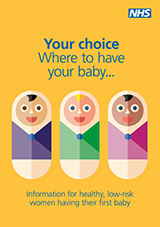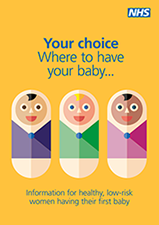Maternity
Where should I have my baby?
Where should I have my baby?
We offer a range of options about where you can have your baby depending on your personal circumstances and your preferences. At your first appointment with your Midwife (the booking appointment), you be given advice about these options as well as throughout the rest of your pregnancy.
At any time during your pregnancy or labour, our Midwives will highlight any factors which are relevant to your decision about where to give birth.
They will explain and discuss these factors with you and advise you on options for care and the implications of any decision so you can make an informed choice. You will be involved in all aspects of decision making and your wishes will be respected.
Your Choice - where to have your baby? |
 For women having their first baby |
 For women have given birth before |
Birth place options
Home birth
If you've had an uncomplicated pregnancy, you might be considering having your baby at home. Being in familiar surroundings can make you feel more relaxed which can speed up your labour and reduce the need for pain relief and intervention. You will also have more chance of being looked after by a midwife you've got to know during your pregnancy. Your Midwife will visit you at home in your pregnancy to discuss having a homebirth and bring a homebirth medical kit with everything needed for the birth of your baby. Midwives are also able to bring gas and air (also known as Entonox) to be available if you wish to use this.
In the early stages of labour, you may want to have a warm bath or take some paracetamol and try to rest. Once you are contracting regularly, you will need to call your Midwives to let them know. Two midwives will arrive at your home to support you with your birth, who will encourage you to be mobile throughout the birth at home, which means moving around, going to the toilet regularly, and eating and drinking.
Your midwives will advise regular monitoring of you and your baby throughout your labour to make sure your labour is progressing and you and your baby are well. If your midwife has any concerns about the wellbeing of you or your baby, after discussion and agreement with you, they will call for further support and assistance which may include transferring you to a hospital by ambulance.
Once you have birthed your baby and placenta, the midwives will check you and your baby and are equipped to give you any stitches you might need. (Most tears can be sutured at home by a midwife but sometimes you may need to go into hospital with your baby and support partners.) They will then assist your supporters with clearing up and taking away the placenta if you so wish.
Your midwives will stay with you until you and they are happy that you are comfortable and well. Whether you plan to breastfeed or formula feed, they will help you with your baby's first feed, if you need it. Before they leave they will talk to you about what support is available and your next appointments.
Birth Centres in Wiltshire and Somerset
Birth in a midwife-led birthing unit
If you've had an uncomplicated pregnancy and you are fit and well, you might be considering having your baby a midwifery-led unit. Midwifery-led units are designed to feel welcoming and homely. RUH Maternity Services offer birth at units in Frome and Chippenham.
You will have access to pain relief in the unit such as gas and air (also known as Entonox) and pethidine or diamorphine, but if you would like an epidural or require any intervention including a forceps or a Caesarean birth, you will need to be transferred to a consultant-led unit.
When you arrive at the birthing unit you will be given a birth room. If you are planning on using a birthing pool, you can wear whatever feels comfortable.
As part of the care the midwives provide they will offer to listen to your baby's heartrate. This helps to provide information on your baby's wellbeing. They will also check your pulse, blood pressure and temperature regularly to ensure that you are well.
Your midwife will encourage you to move around in labour to different positions that are comfortable for you because being mobile in labour helps the baby to move into the right position for birth. If your midwife has any concerns about the wellbeing of you or your baby, after discussion and agreement with you, they will transfer you to the consultant-led unit which has more equipment available to assess you and your baby's wellbeing.
Once you have birthed your baby and placenta, the midwives will check you and your baby and are equipped to give you any stitches you might need. (Most tears can be sutured in the midwife-led unit but sometimes you may need to be transferred to the consultant-led unit with your baby and support partners.) If you have an uncomplicated birth, you will be able to relax in the same room where you gave birth.
You might feel ready to go home as soon as two to three hours after birth but if you need or want to stay longer then you will most likely be moved to a postnatal ward. Whether you plan to breastfeed or formula feed, the midwives will help you with your baby's first feed, if you need it.
Before you leave the hospital, your midwives will talk to you about the support that is available to you and your next appointments.
Birth in the RUH consultant-led unit
If you've had complications in your pregnancy or you have risk factors your midwife or doctor has discussed with you, you may be advised to have your baby in a consultant-led unit. Even if you haven't had any complications, you may decide you would prefer to have your baby in hospital.
You will be looked after by midwives but you will also have access to doctors (obstetricians) if your birth becomes complicated and anaesthetists who can provide an epidural or other pain relief. An epidural is an anaesthetic that numbs the lower half of your body. You can only receive an epidural in a consultant-led unit. People who give birth in an consultant-led unit are more likely to have interventions such as a forceps, ventouse or caesarean birth. You can only have an epidural in a consultant-led unit.
Consultant-led units also have doctors who specialise in newborn or neonatal care. Our consultant-led units have birthing pools so you may be able to use water in your labour depending the type of pregnancy you've had.
When you arrive at the consultant-led unit, you will usually be taken to a birth room and offered an antenatal check and to discuss your birth preferences. After this, you will be offered a vaginal examination as part of the assessment to see if you are in active labour.
As part of the care that the midwives provide they will offer to listen to your baby's heartrate. This helps to provide information on your baby's wellbeing. They will also check your pulse, blood pressure and temperature regularly to ensure that you are well.
Your midwife will encourage you to move around in labour to different positions that are comfortable for you because being mobile in labour helps the baby to move into the right position for birth.
Once you have birthed your baby and placenta, the midwives will check you and your baby and are equipped to give you any stitches you might need. (If required, you may need to go to a theatre room to have stitches by a doctor.) If you have an uncomplicated birth you will be able to relax in the same room where you gave birth and cuddle your baby, skin to skin.
Whether you plan to breastfeed or formula feed, the midwives will help you with your baby's first feed, if you need it.
Before you leave the hospital your midwives will talk to you about the support that is available to you and your next appointments.
Virtual Tours and Antenatal Classes


